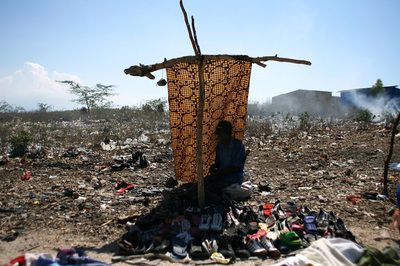The Pew Center Project for Excellence in Journalism revealed this week that we’re already getting bored with Japan and we’re starting to lose interest in Libya. Japan, according to Pew’s weekly monitoring of news sources, accounted for 12% of the coverage last week. “That compares with 15% the previous week and a whopping 57% the week before that,” it said. The economy and a government shutdown is about to become the crisis du jour.
Remember Haiti? It’s getting almost no coverage anymore even though it remains the disaster it was when an earthquake hit in 2010.
We hear these disasters dominate for a week or so, and then they quietly slip away. Often, we ask “what do you want me to do about it? Haiti is one such story.
Lindsey Boeser, who works at Fast Horse, a Minneapolis marketing agency, did something about it, which is why her blog post at the firm’s Idea Peepshow blog is today’s must read.
Boeser says she’s been trying to recover from the loss of her boyfriend in a helicopter accident and says it was “time to stop focusing on myself and turn my attention toward others who are hurting.”
And from her description, hurting remains an understatement…
The streets were littered with towering piles of trash, baking in the 90-degree heat along with human and animal feces, making for a smell so strong, many could not bear it. There were people bathing in the rivers next to women who were doing laundry. Stray animals roamed the streets, including bulls, donkeys, dogs, roosters and goats. Animals were being skinned right on the streets and hung from the tiny tarp tents, where they sat in the hot Haitian sun until a few cents could be made by selling it for dinner. Children and adults ran after the tap taps with baskets of cold beverages on their heads in hopes of making some money off thirsty travelers. Many of the children were shoeless and without bottoms as their families couldn’t even afford food, let alone clothes.
Haitian families often spend their entire lives trying to pay off the $1,200 it costs for the tiny piece of land their tent home sits upon. Haitians make $1/day, if that. The average age is 18 and most children don’t live past the age of 15 as they die of starvation and disease. I’ve heard statistics like these before, but now I was seeing for the first time with my own eyes the truth behind them. I could feel my heart breaking more and more with each passing second.
It doesn’t sound anything like a miracle, but that’s the word former president Bill Clinton used today to describe Haiti.
Speaking at the United Nations, Clinton says over $5 billion was raised to help Haiti, but only 37 cents of every dollar donated has been disbursed.
In an editorial this week, the New York Times this week said an epidemic of rape of women and girls has broken out in the camps where people sought what passes for shelter after the quake:
While the world’s attention has turned elsewhere, Haiti’s misery remains. The U.N. reported in March that contributions to its ongoing emergency appeal are lagging and funds are running out for even such basics as clean-water delivery and sewage removal. This month’s meeting of Haiti’s recovery commission and the selection of a new president may begin to put the recovery back on track. Women and girls in Haiti’s camps must not be forced to live in constant fear.
(Photo: A shoe salesman waits for customers at the market in Titanyen, a settlement north of Port-au-Prince. The fields outside Titanyen were used as mass graves for victims of the Haiti earthquake. Photo by Hector Retamal/AFP/Getty Images)

